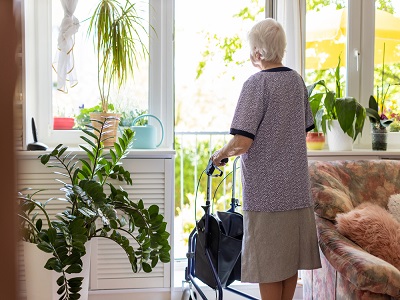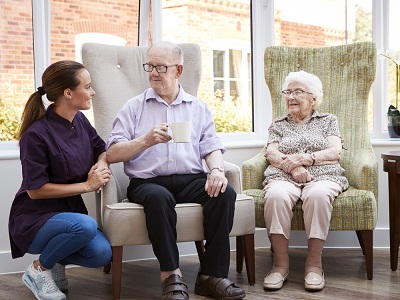
Memory care is a great option if it becomes difficult to care at home for someone with Alzheimer’s or dementia. Memory care is a type of long-term residential care that offers intensive and specialized care to people with memory problems.
Many nursing homes, continuing care retirement communities, and assisted living facilities have memory care “neighborhoods”, which are designed for dementia patients. You can also find standalone memory care facilities.
According to the National Investment Center for Seniors Housing & Care (a non-profit that tracks industry trends), memory care is the fastest growing sector in senior housing. As COVID-19 devastated many long-term care facilities, occupancy rates dropped in 2020.
Many assisted living facilities have had to struggle with staffing since the pandemic. The quality of memory care units has also varied widely. As you think about whether memory care is right for your loved one, it’s important that you visit the facility and ask questions.
What is the difference between memory care and other types of care?
Memory care is designed for those with Alzheimer’s and dementia to have a structured, safe environment that reduces stress. The employees provide meals and assist residents with personal care tasks. However, they have been specially trained to handle the unique problems that can arise from dementia. They visit residents more often and offer extra structure and support to help them get through their day.
Residents in regular assisted living are expected to manage their time. Menus and meal times are posted but staff are not constantly checking in on them. In memory care, staff make sure residents get to their meals, go to activities, and etc.
Memory care facilities use alarm doors and elevators that require codes to ensure residents stay on the premises. Many facilities offer tracking bracelets, which allow residents to roam freely but also permit staff to track their movements.
Activities are offered to enhance cognitive function and encourage residents at various stages of the disease.
Selecting a memory care facility
Start your search at AARP or the Alzheimer’s Association’s Online Resource Finder. This online directory includes information about senior care services. Click on “Housing Options”, select the type of residence you want (e.g. assisted living or continuing-care retirement community), and then enter your zip code. The results will show information about whether the facility offers memory care.
Experts recommend visiting each memory care residence you have narrowed down several times. This includes at least one visit in the evening when staffing is less.
These are some things to keep in mind as you search.
Factors To Consider
Layout and physical environment
Is it clean and comfortable? Are there circular hallways so that residents don’t feel lost? Are all rooms and doors clearly marked (with pictures and words) so residents can find their way around? Are there walking paths in an enclosed area? Are residents happy?
The Staff
Many long-term care facilities across the country are now severely short of staff because of the COVID-19 pandemic. Ask about staff shortages in the communities you visit. Also, pay attention to how staff interact with residents. Are they able to meet their needs quickly? Does the building have a nurse? What type of dementia-specific training does the staff receive? You should ask how they handle someone who is aggressive.
COVID-19 policies
The pandemic was particularly devastating to long-term care facilities. Many memory care patients were left feeling lonely and isolated during lockdowns. Research shows that dementia patients with dementia experienced a rise in their mental health, agitation, and severe behavioral disturbances due to social restrictions.
Ask about the rules that will be in effect in case of an outbreak when you are looking at a center. Is visitation allowed? If so, how will it be done? What will the staff do to communicate with families? What will the staff do with families?
Food and other activities
Is there any activity that could keep your loved one entertained? What are the strategies used by staff to encourage residents to eat? Watch to see if staff engages residents in the activities.Do they seem like they know residents personally?
Access to continuing care
Some assisted living units for memory care can’t offer complex medical care. Learn about the health conditions and behaviors that could force your loved one out of the facility or make it more costly. Ask if the facility is accepting Medicaid.
What is the cost of memory care?
It is not surprising that the memory care unit offers a higher level of supervision and care, but it comes with a steep price.
The average monthly memory care rent in the United States is $6,935. This is significantly higher than assisted living which averages $5380 per month but much lower than the $10562 average monthly cost for a nursing home.
Prices vary from one state to the next and are affected by the quality of care received.
Medicare Advantage and Medicare will generally not pay for personal care or room and board in an assisted living facility. However, they will cover the cost of medical care provided by the facility. Veteran benefits often cover the cost of assisted living facilities for eligible veterans, and surviving spouses. Medicaid coverage may be available for your loved one if they no longer have assets. However, it is only available if the facility agrees to provide long-term care.
Most families who use memory care must pay out of their own pocket. If your loved one has long-term care insurance, it can be very helpful. To help pay the cost, families might sell assets or tap into the “living benefits” on a life-insurance policy.
You need to plan if you believe they will need memory care. There are many ways to preserve assets and be eligible for Medicaid.
Reflections Assisted Living at Carolina Forest can help if you’re looking for the best facility for your loved one who needs specialized care.
Like our Facebook page for more great info about assisted living facilities in Myrtle Beach.
Reflections Assisted Living at Carolina Forest
219 Middleburg Dr
Myrtle Beach, SC 29579
(843) 903-0700
https://www.reflectionsassistedliving.com/





 8. Attend the Evens At The Next Facility
8. Attend the Evens At The Next Facility
